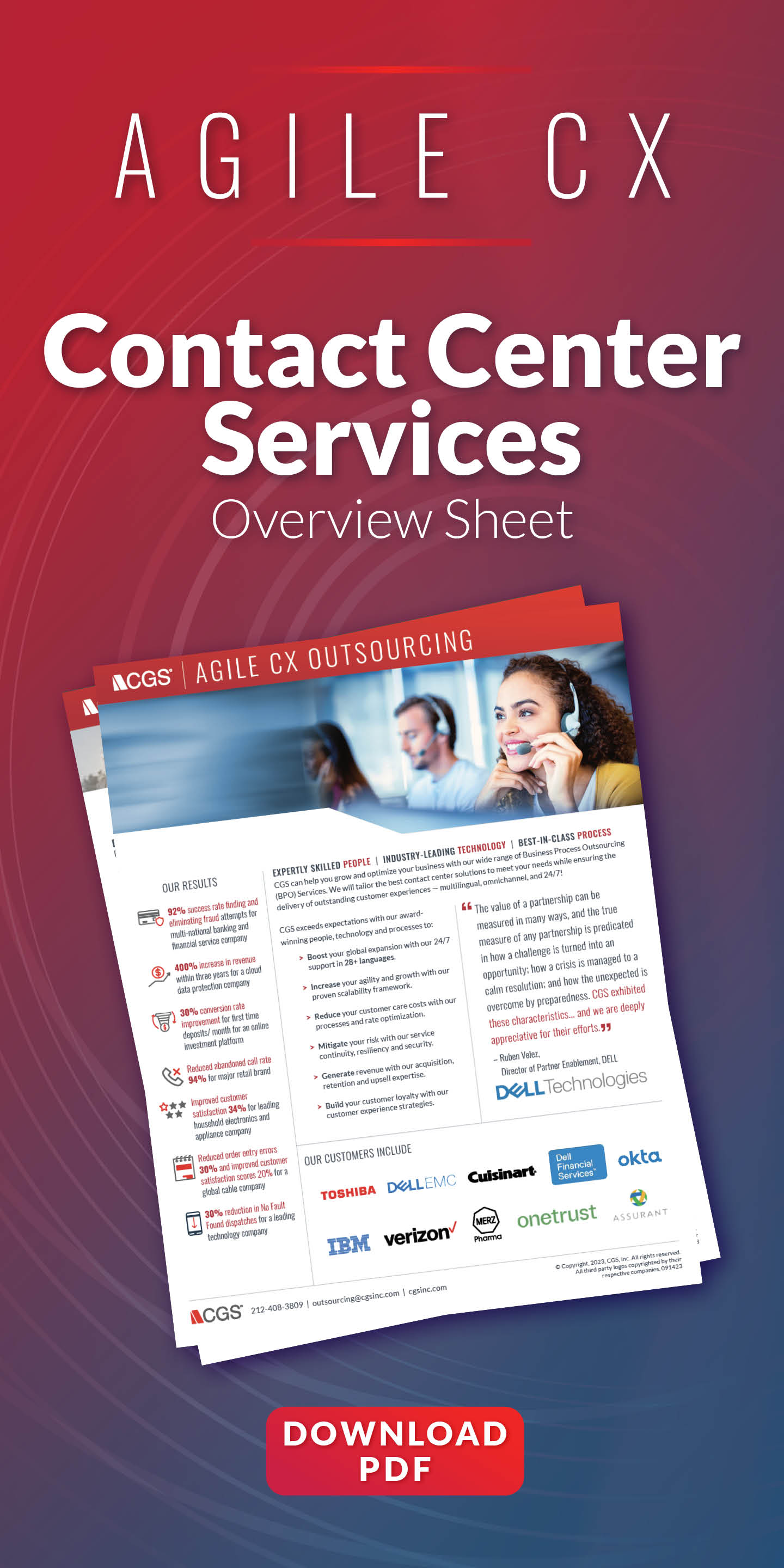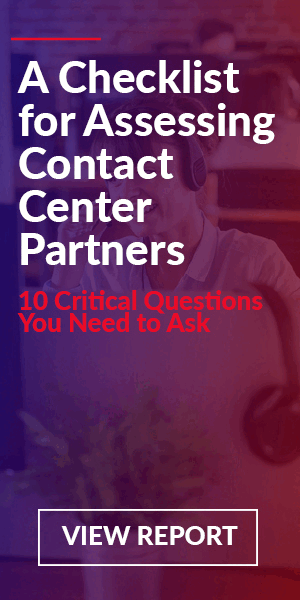Topics
Ensuring Quality When Outsourcing Call Center Services

While outsourcing your call center can be extremely beneficial, not all partners will offer the same level of quality. For some, you'll need to take a hands-on approach to ensure high-quality results, but too much involvement may not be convenient or valuable for you. Fortunately, the right strategy and partner can help you balance control and quality assurance in outsourced call centers. We've outlined six key elements of outsourced call center quality management that can help you use these services effectively.
1. Define Quality Assurance Metrics and KPIs
Take some time to identify your expectations and objectives, ideally before you start a partnership with a call center provider. By outlining your plan for the arrangement, you can set both parties up for success and build a solid foundation from the start. You can also ensure a partnership with a company with the ability to meet your needs.
With your objectives identified, choose key performance indicators (KPIs) to monitor. While your call center provider should track these metrics, you should ensure they align with your overall goals, assessing the customer experience and call center operations.
Examples of KPIs for call center quality assurance include:
- First call resolution (FCR): FCR explores the number of calls an agent can resolve without transferring, escalating, pausing or returning a customer call. If the agent can solve a problem on the first call, they can help improve the customer experience and build a better relationship with the company. It's also more efficient.
- Customer satisfaction score (CSAT): The CSAT measures customer satisfaction for the call center experience or your business as a whole. This score usually comes from surveys, which can vary widely but calculate CSAT as a percentage of satisfied customers.
- Customer retention rate (CRR): The CRR looks at how long your customers typically stay with you over a specified timeframe. Your call center may only be a portion of the total CRR, but this metric can still help you track its effects.
- Average waiting time: As the name implies, this metric gauges how long your callers typically wait before speaking to an agent. A low value can reflect better customer satisfaction and a more efficient call center.
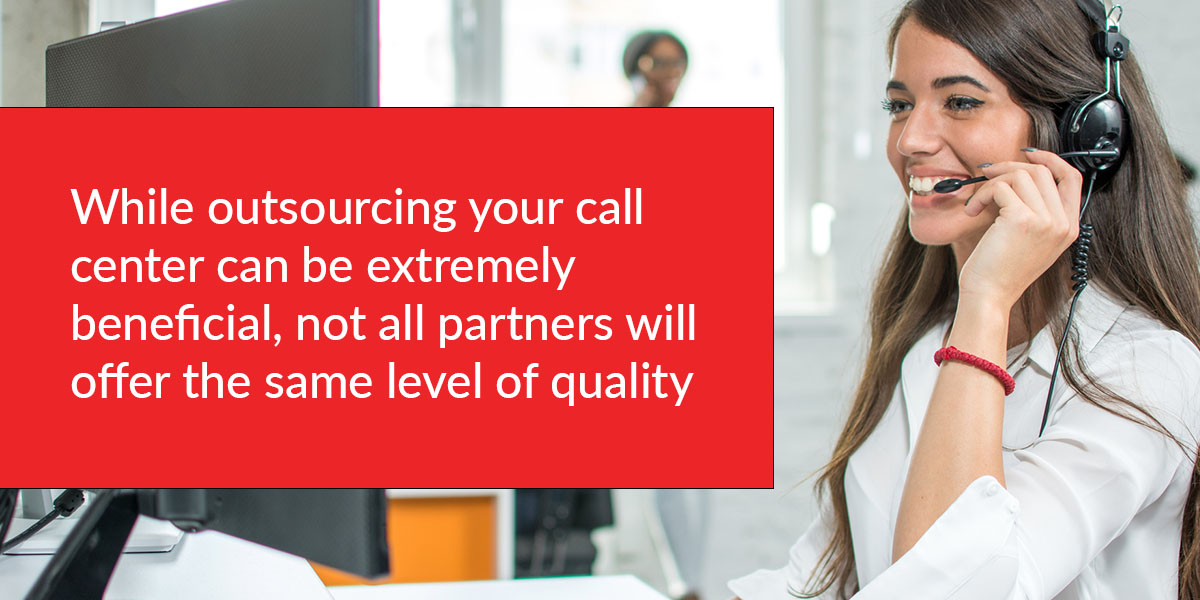
Use your KPIs to build a detailed service level agreement (SLA). Your SLA maps out your agreement with the call center, which is considered a business process outsourcing (BPO) provider. It should outline the scope of work the provider delivers and which performance standards they should meet, such as availability and response times. The SLA puts your arrangement in writing, defines responsibilities and holds both parties accountable.
A detailed document can help reduce risk by outlining these elements. It also gives the BPO provider a valuable resource with clear guidance on how to meet your needs, allowing you both to build a stronger partnership.
2. Monitor Performance Regularly
Although your vendor will likely track metrics, your team must use them effectively. Understanding how to monitor outsourced call center performance helps you ensure quality for callers and your organization. Regularly collect data on your call center and perform periodic audits to assess individual agents and the overall team. Consider partnering with a BPO vendor who leverages advanced real-time monitoring tech that extracts more data and uses it effectively.
Establish a process for ongoing performance monitoring built around the objectives in your SLA. By ensuring visibility for your outsourced call center quality monitoring, you can prevent this process from becoming siloed from the rest of your organization. Get insights into your user experience by reviewing calls and customer feedback.
Alongside your KPIs, assess aspects like ticket volume or categories to find opportunities. Audits can help you verify the vendor's performance and better understand the customer's experience. Improving customer service was the biggest concern for business leaders in 2022, and call center interactions can be crucial in creating a great experience.
Remember, your call center partnership goes both ways. Staying involved in performance monitoring and working with your call center leaders can help you improve processes, such as training or scripts, to continuously deliver better results. Talk through your needs and ongoing performance evaluations to unlock areas for improvement with your vendor.
You'll also want to consider your vendor's performance relative to your business goals. Assess the partnership occasionally to ensure it still offers valuable benefits, like cost-effectiveness and strong customer service. If not, consider finding a new partner or discussing your concerns with the provider.
3. Establish Effective Communication
Communication is crucial for nearly any business partnership, and BPO is no exception. By establishing comprehensive communication channels and processes, you can better ensure transparency and updated information on your outsourced call center's quality management. Good communication is also crucial for effective collaboration with your partner.
Consider the following types of communication to develop a well-rounded approach to this call center outsourcing best practice:
- Communication between points of contact: Determine how often your team will receive updates from the call center's point of contact and vice versa. The point of contact should share regular reports and process updates, while your team should keep the call center informed on any relevant changes, such as updates to your policies or internal processes. Choosing one member of your team to communicate with the vendor can help streamline and simplify these ongoing discussions.
- Escalations and specialized issues: Establish a system for providing timely responses for specialized tickets, such as complex customer issues. The call center should understand when to escalate problems, and your team should know how to respond when needed. This type of communication can help deliver a better experience for callers.
- Communication with end users: Make a plan for effective communication with end users, such as customers or employees. Can they call or chat with the agent? Do you proactively ask for feedback? Assess these touchpoints and how you can improve communication between agents and callers.
Your vendor can support communication efforts with multiple channels for callers and your team. Omnichannel support allows customers to use methods like email, calls and live chats to talk to an agent. They can choose the option that works best for their preferences and workflows while accessing the same high-quality services.
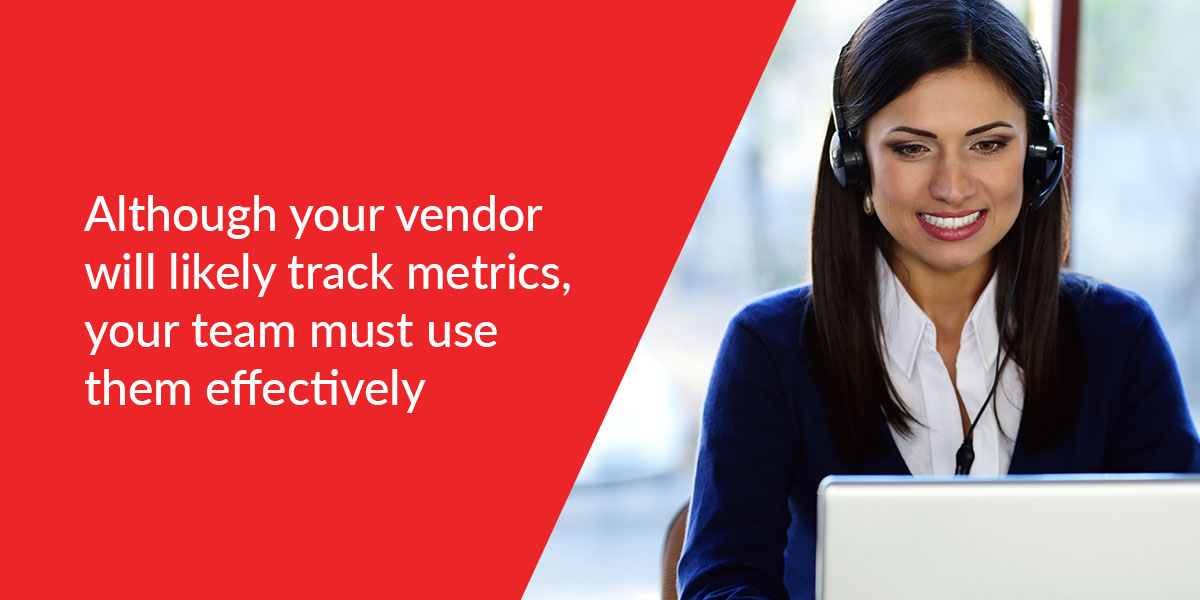
4. Ensure Agents Are Well-Trained
Call center agents play a significant role in each caller's experience. Whether the caller wants a knowledgeable IT person or a sympathetic customer service agent, training often determines how well an outsourced call center can deliver the desired results. Ask your partner about their approach to training, and look for aspects like:
- The human touch: Evaluate how personable the call center's agents are. Do they follow scripts, or do they use their training and knowledge of the company to deliver comprehensive solutions? These agents can be the human face of your company, so finding compassionate people with interpersonal skills can help you provide a better experience to callers.
- Diverse knowledge: In the IT field, call center agents should have a wide array of skills to support different problems. A well-trained team can offer support in various domains, like hardware, software, point-of-sale (POS) systems, security and mobile apps.
- Updates on new trends and technology: Technology and trends move quickly. Ensuring quality assurance in call center outsourcing means staying up-to-date on new developments. Agents can stay on the pulse of the industry and help you stay competitive with continuing education efforts.
- Business-specific updates: Ensure your BPO provider can take your business updates in stride. If you change products or adjust processes, an adaptable team helps communicate those changes to callers and support your new requirements.
- Communication training: If you have an offshore call center, language and cultural barriers sometimes impact communication. Consider whether your vendor trains its team on cultural awareness training and has multilingual agents on staff. You can also implement this kind of training for your own team to facilitate smoother discussions and better resolutions.
If your call center provides support to internal employees, such as technical or back office support, training your workers can also boost the success of the outsourced team. Say you have slow ticket resolutions because employees often submit their issues incorrectly, causing a delay in finding the right solution. You might significantly reduce these errors with a brief training or even an email with more information on submitting tickets.
5. Ensure Data Security With Outsourced Partners
Data security is a major concern for today's businesses, which face rising cybersecurity threats and regulatory pressure to keep information safe. One crucial aspect of quality assurance in call centers is the BPO provider's security standards. These partners may not offer the vigilance you need to keep information safe, but you will likely share important details with them, like customer information or business intelligence.
Evaluate a potential call center's approach to security by ensuring they have specific elements in place. Look for highly trained security specialists who can safeguard all of the data you share with the call center and quickly respond to potential threats. They might have certifications in cybersecurity or IT security management, for example. All agents should also receive ongoing training on security and data handling best practices. Ask about the provider's action plan, IT infrastructure and storage protocols.
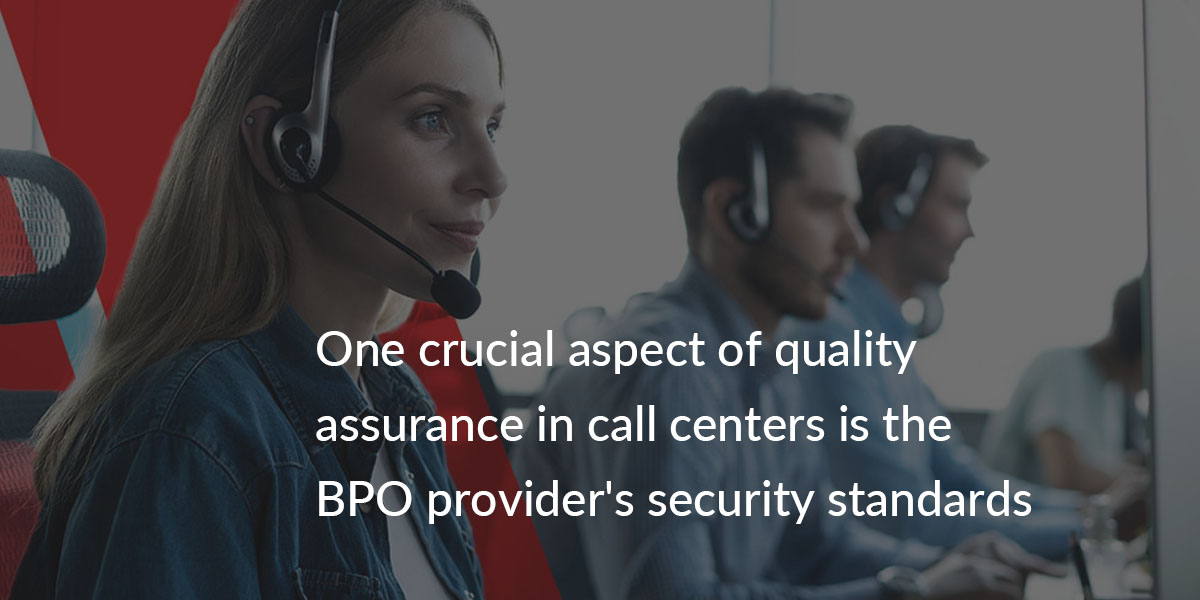
Secure data centers will also meet or exceed industry standards, such as:
- Payment card industry (PCI): PCI standards come from the PCI Security Standards Council and include the Data Security Standards (DSS). They outline requirements and testing procedures that help reduce data breaches and protect payment information, allowing the call center to work with business or customer payments securely.
- System and Organization Controls Type 2 (SOC 2): An organization with SOC 2 compliance has strong internal controls for managing and protecting sensitive data. It includes auditing and reporting structures to ensure security, availability, integrity and confidentiality. Ideally, your BPO provider will have the Type 2 certification, which has a more in-depth evaluation process than Type 1 compliance.
- International Organization for Standardization (ISO) 9001: ISO 9001 addresses quality management and how a business improves performance. It outlines robust quality management systems and attests to the company's ability to resolve complaints and optimize processes. This standard can help you build an effective, long-lasting partnership that evolves to meet your needs.
Adherence to these standards may also help you stay compliant with regulations and avoid fines or penalties.
6. Select the Right BPO Partner
Even the best-laid plan for outsourced call center quality assurance won't help if you don't have the right partner. Your BPO provider will determine your access to vital tools, resources and processes. Varying business practices will also affect the benefits and drawbacks of the call center overall.
Some aspects of a BPO provider that can affect quality assurance for outsourced call centers include:
- Experience: A partner with decades in business will generally offer more reliable service than one with only a few years of experience. Over time, the seasoned provider has honed their practice to offer the best results. They can likely maintain quality while minimizing the need for hands-on control and involvement.
- A strong reputation: Similarly, a BPO with a good reputation probably has a long track record of success. They know how to meet the needs of a diverse client base. Ensure your potential partner can provide proof of their success, such as testimonials from previous clients or performance data. Industry awards are also a great sign.
- Good communication: Collaborating with one partner might be easier than collaborating with another. Some call centers implement systems and mindsets that support more communication with clients. As you talk to potential partners, assess how open they are to your input. Do they want to hear your suggestions and concerns? What kind of communication channels do they offer? Ideally, your BPO will allow you to have as little or as much communication as is right for you.
- Technology: Advanced technology solutions can facilitate better insights, processes and optimization. From augmented reality for in-field support to robotic process automation (RPA) for streamlining tasks, innovative solutions allow a BPO to address many aspects of performance. These might range from customer satisfaction to efficiency, reporting insights and consistency.
- The right location: Many businesses can benefit from either offshore or onshore call centers, but your needs will determine which is right for your organization. Local BPO providers might offer easier collaboration, as you can easily connect with a team in the same time zone. They might have more knowledge of local security infrastructure and compliance requirements. However, an offshore call center with robust communication training can offer more affordable services with easier afterhours support.
Whatever your priorities are for outsourced call center quality management, selecting a qualified provider can help you set up a long-lasting and effective partnership. Don't rush the evaluation process, ask a lot of questions and focus on finding the right fit for your business.
How CGS Can Help You Achieve QA in Outsourced Call Centers

An outsourced contact center's quality assurance will significantly affect your results. Whether you want to be heavily involved with your call center or let the team handle the day-to-day decisions, the steps we've outlined can support an effective, beneficial partnership. A trusted, reputable BPO provider is essential. At Computer Generated Solutions, we use innovative technologies to deliver high-quality BPO services to our clients.
From customer support to employee tech support, our services can help you minimize in-house workloads and achieve your outsourcing goals. We offer onshore, offshore and 24-hour services, complete with highly trained, multilingual teams. We help clients across industries, as you'll see through our long history of satisfied customers and industry awards. Contact us today to learn more about our BPO services and how we can ensure quality in outsourced call centers.

